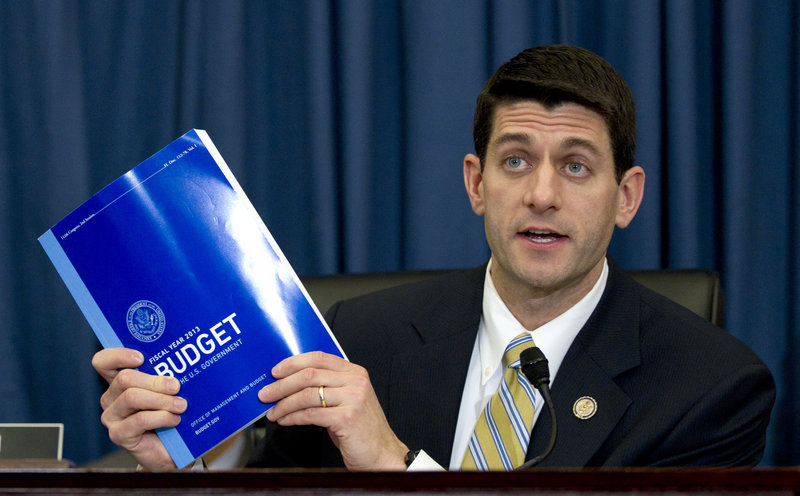WASHINGTON – After a few months of relative peace on the budget front, Democrats and Republicans are readying for a party-defining, election-year fight over trillion-dollar-plus deficits and what to do about them.
The focus in the week ahead will be on the conservative-dominated House, where the Budget Committee chairman, Rep. Paul Ryan, R-Wis., is fashioning a sequel to last year’s “Path to Prosperity” manifesto that ignited a firestorm over Medicare.
The upcoming debate gives Republicans a chance to show how they would tackle out-of-control budget deficits and rein in the cost and scope of government. Those are top issues for the conservative supporters counted on by Republicans to turn out in large numbers in the fall to maintain the GOP’s control of the House.
President Obama played it safe when he released his spending blueprint last month for the budget year that begins Oct. 1. It calls for tax increases on wealthier earners and modest spending curbs. But it would not address the spiraling costs of Medicare and Medicaid, the health care plan for the poor and disabled.
Last year’s GOP measure proposed replacing Medicare fee-for-service payments to doctors and hospitals with a voucher-like program in which the government would subsidize purchases of health insurance on the private market.
Democrats said the subsidies would not keep up with inflation in medical costs and would shift costs to older people, and they accused Republicans of plotting to “end Medicare as we know it.” The uproar was an important factor in a special election in which Democrats seized a longstanding GOP-held House seat in upstate New York. Republicans showed less enthusiasm for the plan after that.
Ryan has since come out with a less stringent version of the measure, in concert with Sen. Ron Wyden, D-Ore., that would keep the traditional Medicare fee-for-service program as an option along with private insurance plans. It features more realistic inflation increases, and less resulting savings for the government, than last year’s measure.
“This coming debt crisis is the most predictable crisis we’ve ever had in this country,” Ryan said in a video statement. “This is why we’re acting. This is why we’re leading. This is why we’re proposing — and passing out of the House — a budget to fix this problem: So we can save our country for ourselves and our children’s future.”
Ryan has yet to disclose the specifics of his plan. It could come out as early as Tuesday, which would allow his committee to sign off on it by the end of the week.
Pressure from conservative lawmakers has prompted GOP leaders and Ryan to reopen last summer’s budget pact and impose further cuts on domestic agencies such as the departments of Education, Energy and Housing and Urban Development.
Last year’s deal with Obama set a $1.047 trillion cap on the annual operating budgets of Cabinet departments and other agencies for the upcoming 2013 budget year.
GOP aides say Republican leaders want to cut that figure by $19 billion, or almost 2 percent, leading to protests from Democrats that Republicans are going back on the deal. The move would make it more difficult to pass follow-up spending bills setting agency budgets for the new fiscal year.
Tea party lawmakers on the House Budget Committee, such as Rep. Mick Mulvaney, R-S.C., have pressed for even deeper cuts, leading to a push-and-pull match with the more pragmatic Republicans on the House Appropriations Committee.
Democrats controlling the Senate do not want a budget debate. Avoiding such a debate protects several vulnerable incumbent Democrats from politically dangerous votes.
Send questions/comments to the editors.



Success. Please wait for the page to reload. If the page does not reload within 5 seconds, please refresh the page.
Enter your email and password to access comments.
Hi, to comment on stories you must . This profile is in addition to your subscription and website login.
Already have a commenting profile? .
Invalid username/password.
Please check your email to confirm and complete your registration.
Only subscribers are eligible to post comments. Please subscribe or login first for digital access. Here’s why.
Use the form below to reset your password. When you've submitted your account email, we will send an email with a reset code.